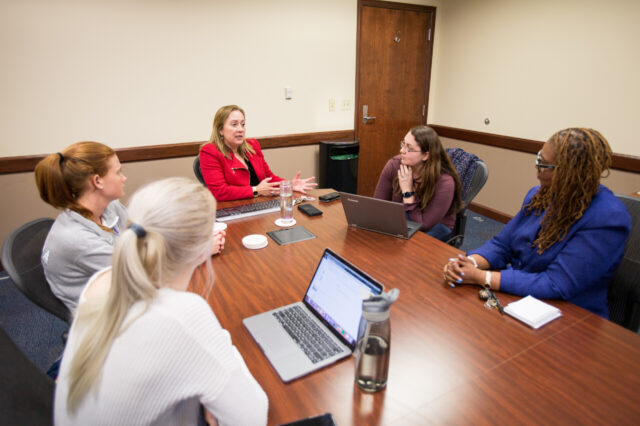Diversity program provides national model for undergraduate nursing schools

To foster and encourage an environment of diversity and inclusion, the University of Florida College of Nursing has created an innovative research and leadership program for underrepresented undergraduate students. The framework of this program is now serving as a model for other colleges that are seeking to create opportunities to advance diversity and inclusion of underrepresented students.
The EMBRACE program, which stands for Engaging Multiple-communities of BSN students in Research and Academic Curricular Experiences, was created at the UF College of Nursing in fall 2016 and continues to evolve as the needs of students, education and health care change. The central pillar of the program is mentorship, and each participating student is paired with a nursing faculty member who best matches the student’s research interest. With the faculty mentors, the students are expected to complete a research, leadership, educational or quality improvement project with their faculty mentor and participate in monthly meetings.
“Junior and senior students who are part of the EMBRACE program are receiving hands-on experiences in research, evidence-based practice and leadership opportunities,” said Jeanne-Marie Stacciarini, Ph.D., R.N., FAAN, a College of Nursing associate professor and director of diversity and inclusion. “During the monthly meetings, they also learn from their peers and from guest speakers, such as alumni who are leaders in research, policy or entrepreneurship, and also current students. The EMBRACE students have the opportunity to present in research conferences, be part of internal and external professional committees and compete for academic awards that acknowledge their work.”
A recent article published in the Journal of Professional Nursing, the official journal of the American Association of Colleges of Nursing, describes the steps, recommendations and theoretical framework for developing this program at other nursing colleges, as well as the program’s initial successes and challenges. The article, titled “EMBRACE: Developing an Inclusive Leadership Program With and for Undergraduate Nursing Students,” was written by Stacciarini and Anna M. McDaniel, Ph.D., R.N., FAAN, the UF College of Nursing dean and the Linda Harman Aiken Professor.
“Through the EMBRACE program, the College of Nursing has developed an exportable model that addresses diversity, leadership and belonging, not only for other colleges at UF, but equally, if not more importantly, a model for the field of nursing to work as a collective to address not just representation but the at-times elusive goal of retention and leadership development,” said Antonio Farias, University of Florida chief diversity officer and senior adviser to the president.
Nyema Eades, B.S.N., participated in the EMBRACE program last year as a senior in the Bachelor of Science in Nursing program. She said the experience opened her eyes to the need for more diversity in nursing research and motivated her to earn a Ph.D. She is now a first-year doctoral student at the College of Nursing.
“Before the EMBRACE program, I did not really understand the purpose and process of research, but through the program, I had the opportunity to present at the Southern Nursing Research Society conference,” Eades said. “At the conference, I noticed there were not many African-American women there with a doctoral degree, and it left me wondering why. I decided that I wanted to pursue a doctoral degree, so that I can be that person to help advance the health of my community and shed light on the much-needed diversity in research.”
Vernell DeWitty, Ph.D., R.N., director for diversity and inclusion at the American Association of Colleges of Nursing, said that one major success of the EMBRACE program is how it takes an innovative approach to motivate students with a diverse background to think about their next steps and have the ability to see themselves advance as nurse leaders.
“How do we prepare the future nursing workforce who will be able to lead and engage in a health care system undergoing a major transformation?” DeWitty asked. “Nurses are in a unique position to contribute to this transformation. Having students early on visualize themselves as leaders and see their abilities through a program like EMBRACE positions them to succeed and move forward.”
DeWitty also said nursing programs that recognize the dynamic shift in the country’s population will be at the forefront of creating a learning environment that welcomes students from diverse backgrounds.
In providing the EMBRACE program’s theoretical framework and recommendations, Stacciarini said she hopes it will encourage other nursing schools to develop similar diversity programs. She also said part of EMBRACE’s success is in the way the program evolves and its ability to stay current for the needs of the students.
“We have encountered challenges and successes throughout the development and progression of the program,” she said. “Previously, no literature existed that outlined how to develop a program through faculty and student engagement to shape minority nursing students into researchers and leaders. It is my hope that other schools can use this or a similar model to implement their own diversity program to meet the needs of an ever-changing population. At the forefront, it is imperative to remember that this is a program for the students and to remember that their success is a success for not only us, but also for the future of health care and these students’ future patients.”
About the author
